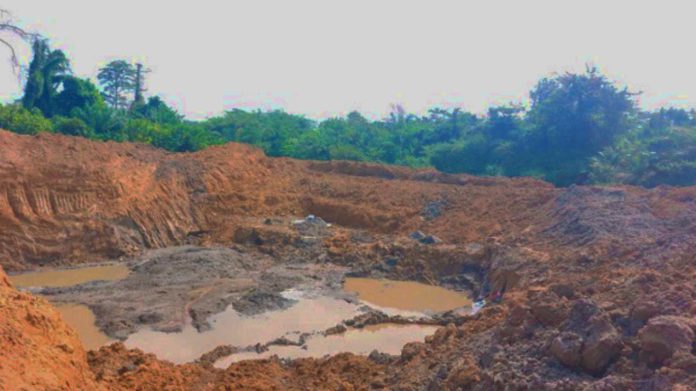Introduction
Ghana heads into a crucial election on Dec 7, 2024. Several issues have headlined social and traditional media discussions ahead of the polls. Mining has been one of these topical issues dominating national discourses for several weeks.
This follows a press statement by the Ghana Water Company Limited, which attributed the gap in producing quality drinking water for the people of Cape Coast and its environs to “illegal mining” activities in our water bodies.
The Ghana Water Company Limited’s press statement indicated that mining activities in the Pra and other water bodies cause pollution, which affects the supply of raw water to the Sekyere Hemang Water Treatment Plant.
These water bodies and tributaries have served as primary sources of raw water supply to the various treatment plants.
This sparked discussions that have transcended into protests, calling the government’s attention to the menace and a charge to implement measures to curb illegal mining.
In the process, the incumbent government has been accused of issuing an astronomical number of mining licenses during its tenure. DUBAWA seeks to highlight the various types of mining licenses granted by the Minerals Commission of Ghana over the period and clarify the number of licenses under the various regimes.
Mining Licenses
According to the Minerals Commission of Ghana, five main mining licenses are granted in Ghana. These include a Reconnaissance license, Prospecting license, Mining lease, Restricted mining lease, and small-scale Mining license.
- A Reconnaissance license is granted to an entity seeking to explore a specific regional area. The license grants the holder a maximum of 12 months, renewable. However, the holder is not permitted to drill or excavate. This license only permits holders to undertake activities with 21 hectares not exceeding 5000 contiguous blocks.
- The Prospecting Licence grants the holder a similar permit. The holder can search for minerals and undertake evaluation activities within 3 years, but the holder is not permitted to exceed 750 contiguous blocks. Upon renewal, the area is reduced to not more than half.
- A Mining Lease permits the holder to extract minerals for 30 years or less. The duration of the license is dependent on the mine life. Mineral extraction is permitted within and not exceeding 300 contiguous blocks.
- A restricted mining lease grants the holder the permit to drill for industrial and building minerals, such as salt and granite, for 15 years.
- Small-scale mining licenses are reserved only for Ghanaians. They permit the holder to extract minerals in a specific geographical area for five years.
Number of Licenses granted
According to the data set on the Minerals Commission’s Ghana Mining Repository, between 1988 and December 2016, 99 licenses were granted to various mining entities/ companies.
Out of the 99 licenses, 1 was a restricted prospecting license, three were reconnaissance licenses, 12 were prospecting licenses, 4 were small-scale mining licenses, two were restricted mining leases, and 77 were mining leases.
Further, the data revealed that 1990 mining licenses were granted from Jan. 2017 to Sep. 2024. The licenses granted include two restricted prospecting licenses, five reconnaissance licenses, 168 prospecting licenses (Ghanaian and foreign), 1,211 small-scale mining licences, 190 restricted mining leases, and 113 mining leases.
Other licenses granted from Jan. 2017 to Sep. 2024 are 274 support service licences (248 class A, 14 class B, and 12 class C), one export license for holders of mineral rights), one gold export license (for processing of tailing and mining waste), one license for earth moving and mining equipment, one test licence (for training purposes), and 23 gold export licenses (buying and export).
Licenses granted under NDC and NPP administrations
DUBAWA’s data analysis revealed that 59 mining licenses were granted under the National Democratic Congress’ rule. On the other hand, under the current New Patriotic Party’s administration, 1990 licenses have been issued for various mining purposes. It is important to note that under the NDC, only 4 small-scale mining licenses were granted, whereas the NPP has granted 1,211 small-scale mining licenses as of Sep. 2024.
| Reconnaissance Licence | Prospecting Licence | Restricted Mining Lease | Mining Lease | Small-scale mining Licence | Others | Total | |
| Era | |||||||
| 1988-2008 | – | – | 1 | 39 | – | 40 | |
| NDC (2009-2016) | 3 | 12 | 1 | 38 | 4 | 1 (restricted prospecting) | 59 |
| NPP (2017-2024) | 5 | 168 | 190 | 113 | 1,211 | 303 | 1,990 |
The table shows the number of licences under the previous (NDC) and current (NPP) administrations. Source: DUBAWA
The Chief Executive of the Minerals Commission, Martin Ayisi, has time without numbers, justified the increase in the number of licenses issued. According to him, many miners operate illegally, destroying the environment in the process and not accounting for mining proceeds. He says when it comes to their attention that some miners are engaging in the practice, they quickly move in, assess the kind of mining, and issue them with licenses to bring the miners’ activities under control and regulation.
Conclusion
Several mining licenses have been granted since 1988. These licenses permit holders to explore, drill, or extract minerals within specific geographical boundaries. It is worth noting that over 1,900 licenses have been granted in the past eight years, compared to the 99 licenses from 1988 to 2016.


